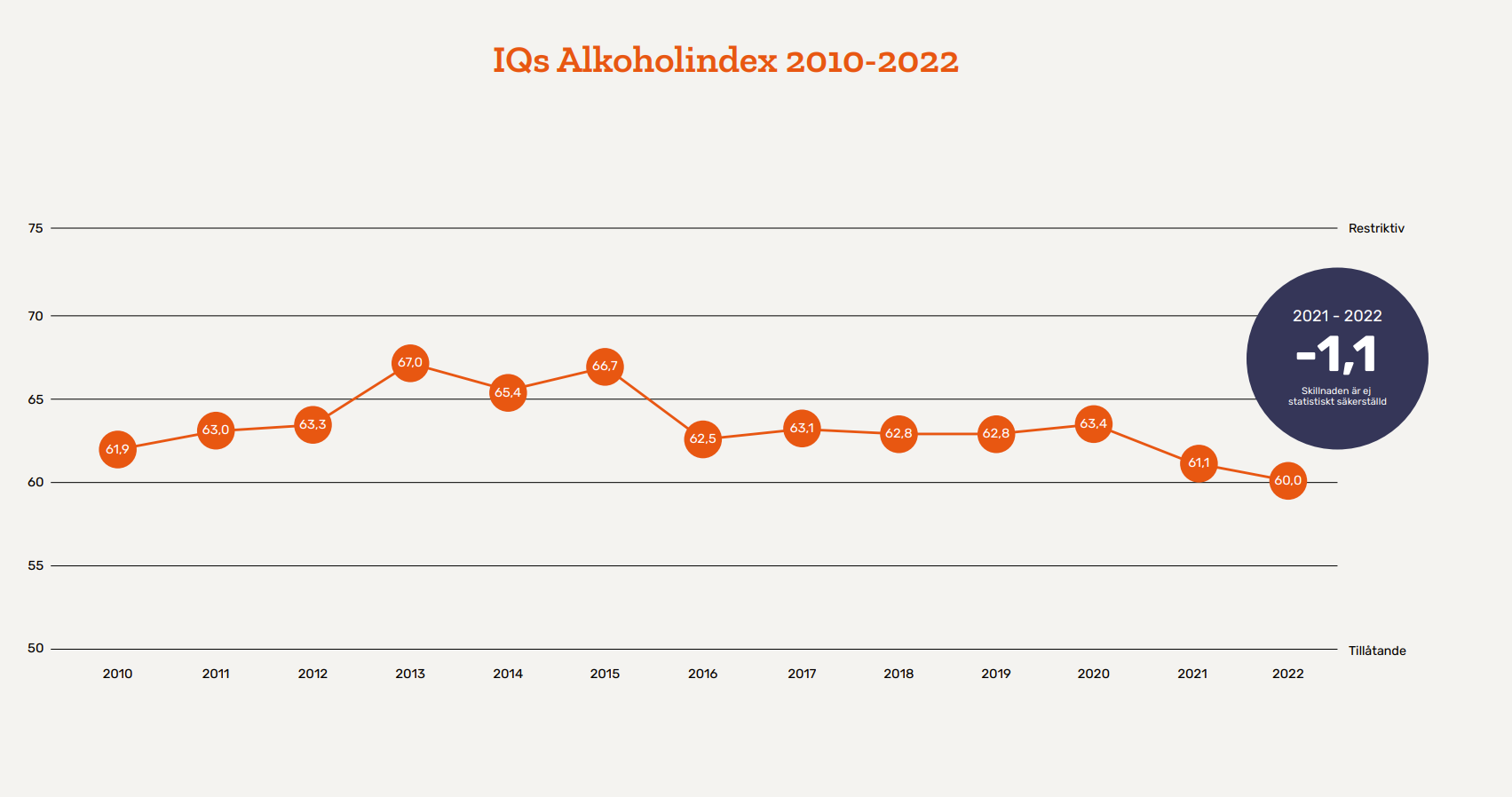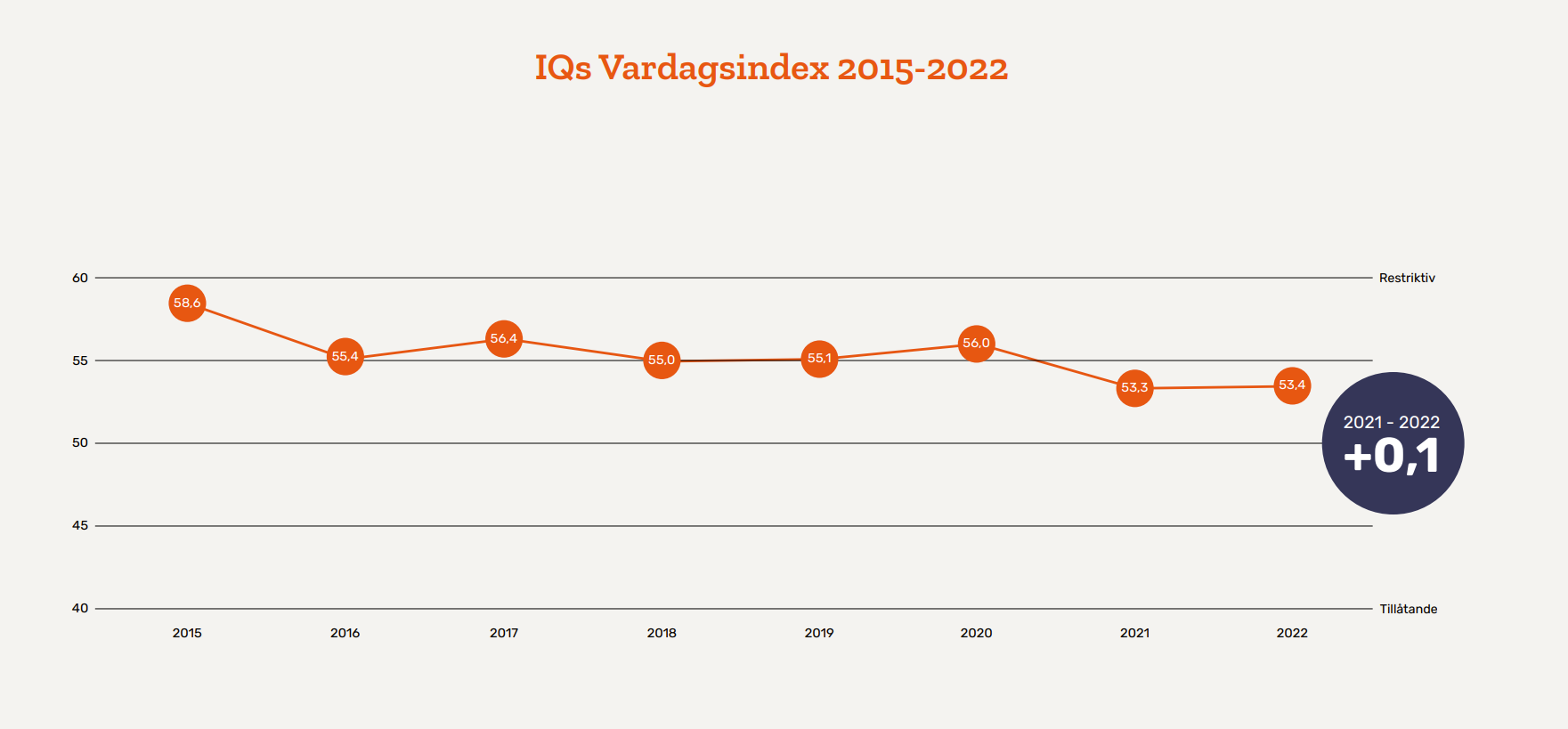Swedes are more liberal towards excessive drinking than ever before
AlcoholMojtaba Ghodsi, CEO of IQ Published 1 Mar 2023
The attitude towards excessive drinking amongst Swedes is now more accepting than ever before. This is the conclusion from IQ:s 12th version of the annual survey Alkoholindex. A similar development towards a more liberal attitude is detectable over the years when it comes to drinking on weekdays. At the same time, alcohol consumption has moved in the opposite direction and has declined over the years.
IQ:s Alkoholindex, shows a correlation between high alcohol consumption, as well as high drinking frequency, and a lower index – meaning more liberal attitudes. We also see a correlation regarding age: elderly people have the most restrictive attitudes, while younger ones are more liberal. This gap has however narrowed down over the course of the last years.

A paradox and a trend
Some of the results of this year’s Alkoholindex are complex, making it hard to draw any straightforward conclusions about particular outcomes. The most important is the paradox of Swedes drinking less, while at the same time becoming more liberal in their attitudes towards excessive drinking. Some might say that Alkoholindex and the opposite trend in consumption might not be a contradiction nor a paradox. Instead, it could simply describe the Swedish mentality adapting to becoming ever more Mediterranean. Others claim that the trend visible in the index may be an early sign that something is about to change regarding consumption and drinking habits. While that may be the case, it is still too early to tell.
IQ also monitors the attitudes towards drinking alcohol during weekdays. That study, called Vardagsindex (translates into Everyday–index), conducted alongside Alkoholindex started in 2015. A similar trend is detectable here: the Swedish people have become more liberal over the years in their attitudes concerning weekday drinking.

In this article we would like to highlight three issues from Vardagsindex and Alkoholindex, that show interesting results over time.
OK to be drunk in the company of children
We see a long-term trend toward less restrictive attitudes when it comes to being drunk in front of children. At the start of the Alkoholindex-survey in 2010, 61 per cent stated that being drunk around children was completely wrong. In 2022 the corresponding number was 50 per cent.
IQ’s position is that is inappropriate to be drunk in the company of children. Children are receptive, and can register that an adult has been drinking, even if it’s just a glass or two. As a parent (or other caregiver), you have a responsibility to take care of your child if anything would happen, making the trend toward a more liberal standpoint worrying.
A wider acceptance for blackouts
Another interesting trend we see in the data concerns drinking to the degree that one doesn’t remember how much was actually consumed. Attitudes have shifted over the years to a more liberal standpoint. In 2010 more than two thirds (68 per cent) agreed that this was completely wrong, whereas in 2022 that number was down to 49 per cent.
Research shows that binge drinking is harmful, making this clear trend toward a more liberal stance on blackouts concerning. However, it is important to keep in mind that this study focuses on attitudes and may not necessarily reflect shifts in actual behavior.
More relaxed views on lunchtime drinking
A majority of the respondents thinks that having a beer or a glass of wine with lunch on a weekday is wrong. However, since 2015 the share that states that it is completely wrong has declined from 72 per cent to 67 per cent, in 2022.
IQ is aware that having a glass of wine on a Thursday is no more harmful than drinking it on a Saturday. However, it could get problematic if you establish new drinking habits, combining drinking during the weekend as well as weekdays, affecting the total consumption. Drinking alcohol at lunch may also affect your work, as well as your colleagues.
All IQ:s reports, including Alkoholindex 2022, can be downloaded here.
This article is written by
Mojtaba Ghodsi, CEO of IQ
on the request of PopNAD


